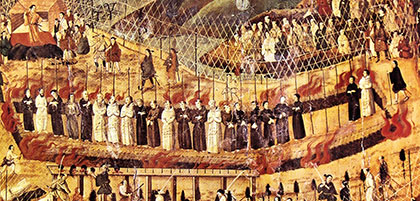
[ABOVE—D. A. Millar, ed. George Buchanan: A Memorial 1506–1906. St. Andrews: W. C. Henderson & Son, University Press; London: David Nutt, at the Sign of the Phoenix, Long Acre. public domain.]
George Buchanan (1506-1582), a Scot, earned the enmity of Franciscan friars by writing satirical verses pointing out how corrupt they had become. He was still a Roman Catholic at the time. As his positions became more Protestant, he encountered more hostility. A master of Latin, Buchanan lectured at the University of Coimbra in Portugal in 1547. Rivals accused him of Lutheran and Jewish practices. One witness said that he had seen Buchanan bowling, eating, and drinking before Mass. It was well-known he ate meat on days prohibited by the Church of Rome. He was brought before the Inquisition. Staying calm, he wrote his own defense. (Another man who was tried at the same time as Buchanan fell to pieces and was burned at the stake.)
Written in Latin his defense begins, “Ego Georgius Buchananus natione Scotus, diocesis Glasguensis . . . ” (“I, George Buchanan, a Scotsman, of the diocese of Glasgow …”). In it, Buchanan frankly admitted some of the charges were true.
He was imprisoned in the monastery of Sāo Bento in Lisbon for seven months. Monks preached to him in an effort to sway him back to fervent Roman Catholicism. He described their discourses as “not unkind but ignorant.” After his release, he returned to Scotland where he threw in with the Protestants and exerted influence in the Presbyterian Church.
While imprisoned, he paraphrased the Psalms into Latin poetry. John Eadie translated those Latin verses into English. Here are verses one, two, and five of Psalm 3 from Eadie. Although the translation is not much better than doggerel, the thought is apt in light of Buchanan’s circumstances.
Alas! how many, and how strong,
Those who ‘gainst me combine,
And harass me with cruel force,
And hatred most malign
How firm the wicked faction, who
Against my life conspire,
And say that aid from God no more
Can me with hope inspire
…
When from his holy hill, by night.
The Lord my prayer hears,
I lay me down, and sleep secure,
And rise devoid of fears.


